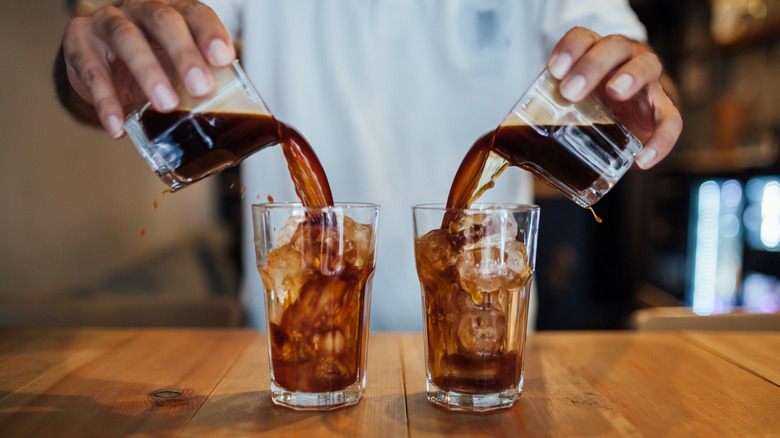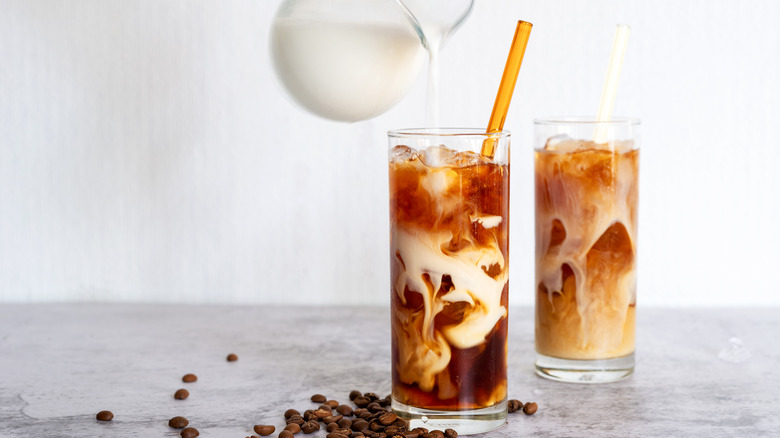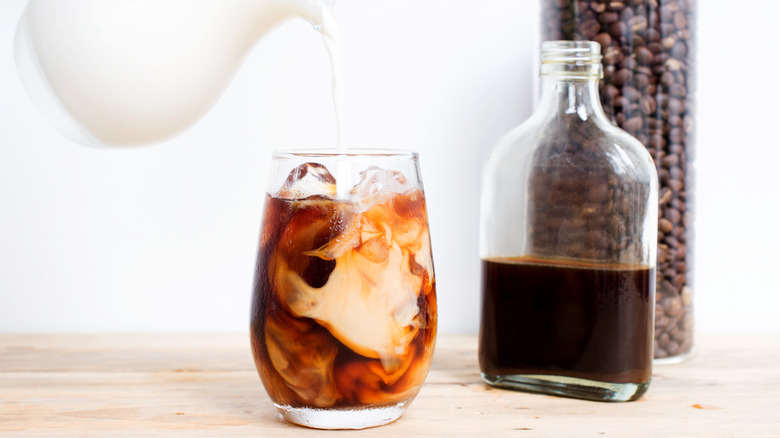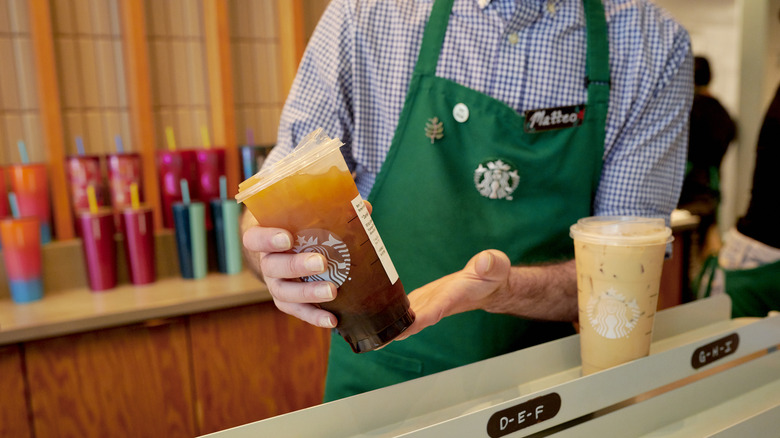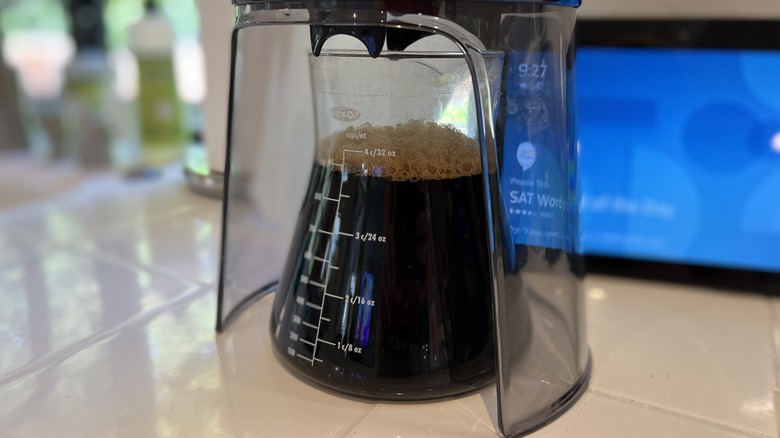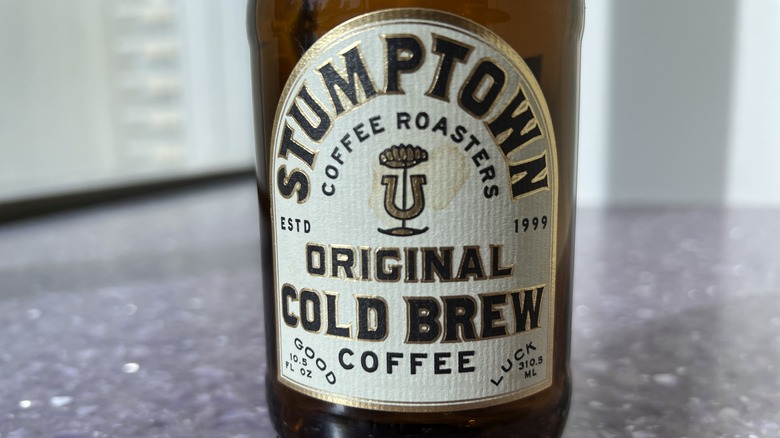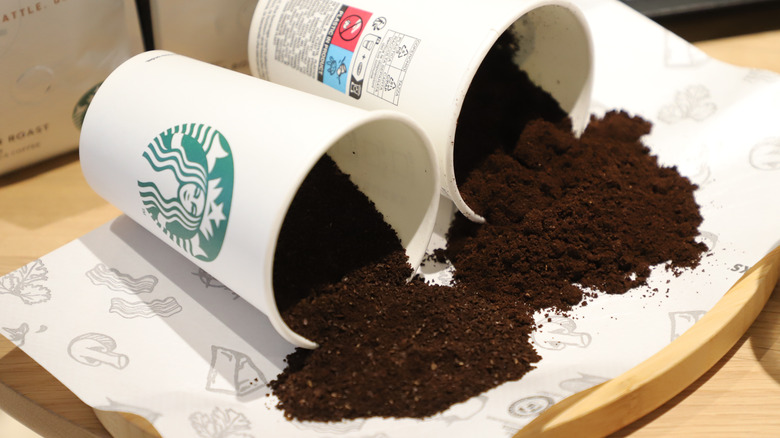What's The Difference Between Cold Brew And Iced Coffee?
If you've ever had a caffeine craving in the middle of a hot summer day, you know that nothing hits like a coffee on ice. These days, though, it is common enough to walk into a coffee shop to order an iced coffee and be asked if cold brew is alright. You say yes since you don't actually know what the difference is anyway. It's basically the same thing, right? That's where you couldn't be more wrong — there is a world of difference between cold brew and iced coffee.
Cold brew coffee has spiked in popularity over the past decade, growing over 300% in the market in just the last six years. It has earned quite a reputation, some of which is based on facts and others rooted in myth. You might know it for being stronger than regular iced coffee, or more flavorful, but do you know why this is? And if cold brew is cold brewed (as it says), then how exactly is all the other iced coffee made? These questions and more will all be answered in our comprehensive comparison of the two popular forms of cold coffee.
What is iced coffee?
It's easiest to start here, with classic iced coffee. Technically, you can call any coffee or espresso drink that is served over ice an iced coffee. It is a broader category of drink, which means that when you travel to other countries and ask for an iced coffee you might get something different than what you're expecting. However, in the United States, iced coffee most commonly refers to regular coffee, brewed hot by drip, French press, or another method, and poured over ice. Technically, cold brew is an "iced coffee," but not all iced coffees are cold brewed. In fact, most of them aren't.
If you order a regular iced coffee at a cafe in America, you are likely to get refrigerated hot brewed coffee made earlier that morning and served over ice. Most places are going to avoid pouring scalding hot coffee onto ice because the drink will immediately turn into watered-down room-temperature coffee. Often hot coffee is slowly cooled to room temperature over the course of an hour or so before being refrigerated and served later over ice.
What is cold brew?
Cold brew might be the new standard for gourmet iced coffee, but what exactly is it and how does it differ from iced coffee? Simply put, cold brew is coffee that has been brewed by steeping the beans in cold water rather than a quick brewing with hot water. This is a major difference that impacts all aspects of the brew including flavor, acidity, and caffeine levels. The brewing process results in a concentrated coffee that should be cut with water before serving.
The recorded history of cold brewed coffee dates back to the 1600s, with origin points cited in Japan and in Dutch countries. In America, cold brew most recently emerged as a popular trend during the 2010s third-wave coffee revolution that swept the country. In socialite circles, it became popular due to the perceived increase in strength of the brew. Although prepared correctly, a balanced cold brew doesn't have to give you the jitters.
Cold brew is sweeter than iced coffee
There is a big flavor difference when it comes to cold brew vs iced coffee, which you might not be aware of if you drink your morning cup with milk and sugar. When it's brewed cold, coffee takes on a much richer flavor profile. In comparison, an iced coffee won't have as strong of a coffee flavor and may even taste watered down. According to Chris Cross, head roaster at NYC's Grumpy Cafe (via Today) cold brew is "a bit mellower and tastes more rounded out." Even coffee brewed with the same beans can taste different when it is brewed in different ways.
Cold brew also tends to be sweeter than hot brewed coffee. The natural flavor of the coffee being brought out more by the longer brewing process is one reason for this and as a result, many coffee drinkers don't find themselves needing to mix in as many additives in their cold brew. Jera Corbin, lead roaster at Dawn Coffee in Nashville, told Food and Wine, "I've had more folks order cold brews black, or with no cream or sugar, while iced coffees are typically ordered with cream and sugar."
Cold brew is more concentrated than iced coffee
To make cold brew, you need to steep ground coffee beans in cold water to slowly extract the flavor from the grounds. The process takes numerous hours of work and a deal of patience. The brew must be stored at room temperature or slightly chilled while the grounds steep.
Due to the brewing method used, cold brew ends up being much more concentrated than regular iced coffee. Concentration is what impacts caffeine levels in your coffee. Cold brew is often sold concentrated, like orange juice, and suggests the buyer cut the mixture with water.
However, cold brews can come out to varying levels of strength. What impacts concentration the most during the cold brew is the water ratio you use. When hot brewing coffee, the common ratio for pour-over and drip coffees is 1:16 coffee to water, while cold brew is often closer to 8 or 9:1. However, if your cold brew is this concentrated it often is not what many would consider "ready-to-drink." Diluting highly concentrated brews with water, milk, or milk substitutes can be important to keep their caffeine content at a reasonable level.
Cold brew doesn't necessarily have more caffeine than iced coffee
There is a myth that cold brew will always have more caffeine than iced coffee. There is some scientific basis to this belief, based on what we just detailed about concentration levels, and it certainly turns out to be the case quite often. However, the reality of cold brews are much more complicated than that and if you're brewing your own you have plenty of control over the amount of caffeine.
Cold brew does tend to have more caffeine due to the concentration, but the caffeine content of a specific cold brew can vary wildly. In 2019, it was documented that 16 ounces of Starbucks cold brew contains a caffeine level of 12 milligrams per ounce. At the time, this exceeded the caffeine levels in the chain's iced coffee but failed to reach the levels of even a regular hot coffee, which came in at 20 milligrams per ounce. This shows that even at the largest coffee chain in America, the common knowledge about the caffeine levels of cold brew might be nothing more than incorrect assumptions. It's always wise to check the caffeine content in your drink before you buy.
Is cold brew less acidic than regular iced coffee?
The common knowledge is that cold brew is less acidic than iced coffee. But diving deeper you'll find this is a real question and science honestly argues it both ways. There are studies in support of both sides, based on different sets of research.
In 2020, a study in Foods demonstrated that in the tests it ran, there were decreased acidity levels found in cold brew as compared to hot brews. Using three different types of Arabica Columbian coffee beans, this comprehensively proves that for many coffees the myth is indeed true. Cold brew is less acidic than hot brew in these cases. A lower acidity can be easier on the stomachs of those with acid reflux, making it a better choice for morning drinks.
On the other hand, in 2018 a study in Scientific Reports compared cold and hot brews prepared with the same grind-to-coffee ratio. In this instance, comparable pH levels were found, arguing that compared to hot brew coffee there is not much of a difference in the acid level and its impacts on your health.
Cold brew is more expensive to make than iced coffee
We aren't just talking about the price tag when you walk into your local new-age coffee shop here. Sure, on average, you'll pay more for a cup of cold brew than you will a hot coffee, or even a regular iced coffee. However, that difference is actually quite earned, as the cost to brew cold coffee at home is much higher than that of hot java.
When brewing cold, it takes three times the amount of coffee grounds to brew the same amount you would yield from a hot brew. Taking into account the price of beans, it's already three times as expensive as the alternative. Now consider that cold brewing requires a greater investment in equipment.
It's pretty easy to get your hands on an affordable drip coffee maker or pour over. Not so with the more niche, and therefore expensive, equipment needed to make cold brew at home. It can be well worth the investment in terms of flavor — and it might save you money over going to the cafe every day — but there is no doubt making cold brew costs more than iced coffee.
Cold brew takes longer to brew than iced coffee
If you want to brew something fast, hot coffee and espresso obviously have the advantage over iced drinks. But when it comes to iced coffee, it is going to take a longer time for you to whip up cold brew from scratch compared to hot brewing methods, which will take a few hours at most if you are brewing hot coffee and then cooling it down.
To make cold brew, coffee grounds need to steep in cold water for at least 12 hours. This is a much longer process than brewing a pot of coffee and letting it cool for an hour or two. Experts and NYC favorites Stumptown Roasters say the ideal amount of time to steep a pot of cold brew is about 16 hours, and not longer than 24. The precision required to dial in the perfect pot of cold brew verges on hobbyist territory and the endeavor is not recommended for the casual iced coffee drinker.
Cold brew beans are ground coarser than for drip coffee
It is common knowledge among the coffee brewing community that one of the differences between making cold brew and hot coffee is how coarsely you need to grind the beans. For a regular pot of coffee, it's good to have the beans ground finely. Not as fine as you would grind for an espresso machine mind you, but fine. This way you don't get large chunks of grounds in your morning brew, especially when using a French press, for example. Cold brew doesn't work this way and, in fact, it's quite the opposite.
Grounds for cold brew should be more coarse than your grinds for hot coffee. Since the cold brew beans should steep for anywhere between 12 and 24 hours, you are going to want to make the grounds bigger so they more easily absorb water. This will result in a rich, deep, and concentrated flavor. Brewing with coarse grounds allows you to reap the most benefits out of the cold brewing process.
